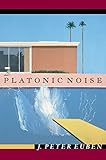Platonic Noise / J. Peter Euben.
Material type: TextPublisher: Princeton, NJ : Princeton University Press, [2009]Copyright date: ©2003Edition: Course BookDescription: 1 online resourceContent type:
TextPublisher: Princeton, NJ : Princeton University Press, [2009]Copyright date: ©2003Edition: Course BookDescription: 1 online resourceContent type: - 9780691114002
- 9781400825585
- American fiction -- Greek influences
- American fiction -- 20th century -- History and criticism
- Comparative literature -- English and Greek
- Comparative literature -- Greek and English
- Greek literature -- History and criticism
- Political science -- Greece -- Athens
- Politics and literature -- Greece
- Politics and literature -- United States -- History -- 20th century
- PHILOSOPHY / Ethics & Moral Philosophy
- 880.9/001 22
- PA3061 .E93 2003eb
- online - DeGruyter
- Issued also in print.
| Item type | Current library | Call number | URL | Status | Notes | Barcode | |
|---|---|---|---|---|---|---|---|
 eBook
eBook
|
Biblioteca "Angelicum" Pont. Univ. S.Tommaso d'Aquino Nuvola online | online - DeGruyter (Browse shelf(Opens below)) | Online access | Not for loan (Accesso limitato) | Accesso per gli utenti autorizzati / Access for authorized users | (dgr)9781400825585 |
Browsing Biblioteca "Angelicum" Pont. Univ. S.Tommaso d'Aquino shelves, Shelving location: Nuvola online Close shelf browser (Hides shelf browser)

|

|

|

|

|

|

|
||
| online - DeGruyter The New Constitutional Order / | online - DeGruyter Law's Dream of a Common Knowledge / | online - DeGruyter The Wheel of Law : India's Secularism in Comparative Constitutional Context / | online - DeGruyter Platonic Noise / | online - DeGruyter The Many and the One : Religious and Secular Perspectives on Ethical Pluralism in the Modern World / | online - DeGruyter Jonathan Edwards's Philosophy of History : The Reenchantment of the World in the Age of Enlightenment / | online - DeGruyter The Power of Denial : Buddhism, Purity, and Gender / |
Frontmatter -- Contents -- Acknowledgments -- I. Introduction -- II. On the Uses and Disadvantages of Hellenic Studies for Political and Theoretical Life -- III. Hannah Arendt at Colonus -- IV. Aristophanes in America -- V. The Politics of Nostalgia and Theories of Loss -- VI. The Polis, Globalization, and the Citizenship of Place -- VII. Platonic Noise -- Notes -- Index
restricted access online access with authorization star
http://purl.org/coar/access_right/c_16ec
Platonic Noise brings classical and contemporary writings into conversation to enrich our experience of modern life and politics. Drawing on writers as diverse as Plato, Homer, Nietzsche, Borges, Don DeLillo, and Philip Roth, Peter Euben shows us the relevance of both popular literature and ancient Greek thought to current questions of loss, mourning, and democracy--all while arguing for the redeeming qualities of political and intellectual work and making an original case against presentism. Juxtaposing ancient and contemporary texts, politics, and culture, Euben reflects on a remarkable range of recent issues and controversies. He discusses Stoic cosmopolitanism and globalization, takes a critical look at Nietzsche's own efforts to make the Greeks speak to the issues of his day, examines a Greek tragedy through Hannah Arendt's eyes, compares the role of comedy in ancient Athens and contemporary America, analyzes political theory as a reaction to an acute sense of loss, and considers questions of agency and morality. Platonic Noise makes a case for reading political theory and politics through literature. Working as much through example as through explicit argument, Euben casts the literary memory of Athenian democracy as a crucial cultural resource and a presence in contemporary political and theoretical debates. In so doing, he reasserts the moral value of what we used to call participatory democracy and the practical value of seeing ourselves with the help of insights from long-gone Greeks.
Issued also in print.
Mode of access: Internet via World Wide Web.
In English.
Description based on online resource; title from PDF title page (publisher's Web site, viewed 08. Jul 2019)


